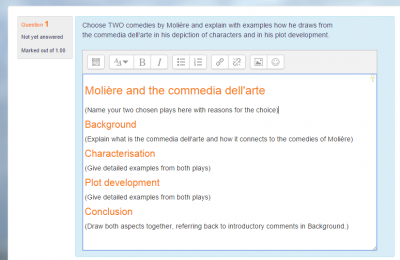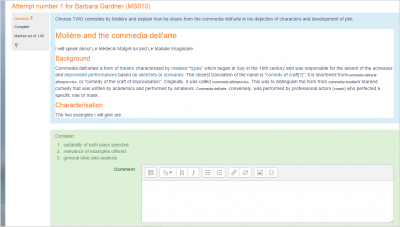Using Quizzes for practice and assessment
4. Set up a quiz
4.2. Question types
You may add a variety of different types of questions in the Quiz. This page is about Quiz module question types. The standard quiz question types are listed below with brief descriptions. Please use the links provided to get more information.Calculated
Calculated questions offer a way to create individual numerical questions by the use of wildcards that are substituted with individual values when the quiz is taken.
More on the Calculated question type
Calculated multi-choice
Calculated multichoice questions are like multichoice questions with the additonal property that the elements to select can include formula results from numeric values that are selected randomly from a set when the quiz is taken. They use the same wildcards than Calculated questions and their wildcards can be shared with other Calculated multichoice or regular Calculated questions.
The main difference is that the formula is included in the answer choice as {=...} i.e if you calculate the surface of a rectangle {={l}*{w}}.
More on the Calculated Multi-Choice question type.
Calculated simple
Simple calculated questions offer a way to create individual numerical questions whose response is the result of a numerical formula which contain variable numerical values by the use of wildcards (i.e {x} , {y}) that are substituted with random values when the quiz is taken.
The simple calculated questions offers the most used features of the calculated question with a much simpler creation interface.
More on the Simple Calculated Question type.
Description
This question type is not actually a question. It just prints some text (and possibly graphics) without requiring an answer. This can be used to provide some information to be used by a subsequent group of questions, for example.
More on the Description question type
Essay
This allows students to write at length on a particular subject and must be manually graded.
It is possible for a teacher to create a template to scaffold the student's answer in order to give them extra support. The template is then reproduced in the text editor when the student starts to answer the question. See Youtube video
It is also possible to include grading information for teachers marking the essay to refer to as they assess the essays.
|
|
|
|
Response template and grader info set up.

What the student sees.

What the teacher sees.
Matching
A list of sub-questions is provided, along with a list of answers. The respondent must "match" the correct answers with each question.
More on the Matching question type
Embedded Answers (Cloze Test / Gap Fill)
These very flexible questions consist of a passage of text (in Moodle format) that has various answers embedded within it, including multiple choice, short answers and numerical answers.
More on the Embedded Answers question type
Multiple choice
With the Multiple Choice question type you can create single-answer and multiple-answer questions, include pictures, sound or other media in the question and/or answer options (by inserting HTML) and weight individual answers.
Short Answer
In response to a question (that may include an image), the respondent types a word or phrase. There may several possible correct answers, with different grades. Answers may or may not be sensitive to case.
More on the Short Answer question type
Numerical
From the student perspective, a numerical question looks just like a short-answer question. The difference is that numerical answers are allowed to have an accepted error. This allows a continuous range of answers to be set.
More on the Numerical question type
Random short-answer matching
From the student perspective, this looks just like a Matching question. The difference is that the sub-questions are drawn randomly from Short Answer questions in the current category.
More on the Random Short-Answer Matching question type
True/False
In response to a question (that may include an image), the respondent selects from two options: True or False.
More on the True/False question type
Source: https://docs.moodle.org/27/en/Question_types
NOTE. If
the questions do not behave as you intend, you cannot find a specific
setting or you encounter other problems, forums available in the moodle.org website can be very helpful. Check out the forum available for discussing the Quiz activity.
